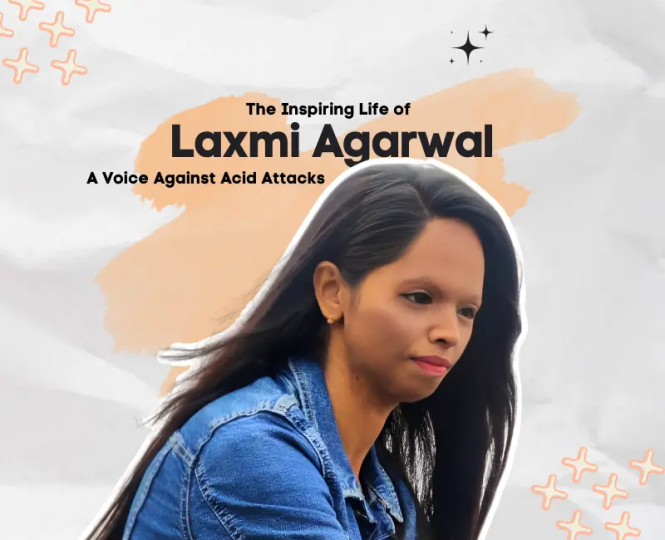The Inspiring Life of Laxmi Agarwal: A Voice Against Acid Attacks

When we talk about strength, courage, and hope, one name that shines brightly is Laxmi Agarwal. She is not just an acid attack survivor; she is a warrior, an activist, a mother, and an inspiration for millions. Her story is not just about survival but about transforming pain into power.
Instead of hiding from the world, she chose to stand tall and become a voice for thousands of survivors. From putting the attacker behind bars to pushing for a ban on acid sales, she has done so much, not just for herself but for every survivor. Her journey is about changing the system, inspiring hope, and proving that courage can rewrite destinies.
In this blog, we’ll walk through the inspiring journey of Laxmi Agarwal, who refused to be defined by tragedy and instead chose to fight back with strength and purpose.
Early Life of Laxmi Agarwal
Laxmi Agarwal was born on 1 June 1990 in New Delhi, India. Like any other girl, she had dreams of studying, working, and living a life full of happiness. She came from a middle-class family and grew up with her family. As a teenager, she loved music and wanted to become a singer one day. But life had something unexpected waiting for her – an event that changed her life forever.
The Acid Attack That Changed Everything
In 2005, when Laxmi was just 15 years old, her life took a heartbreaking turn. She was approached by Naeem Khan, a 32-year-old man working in her neighborhood. He proposed to Laxmi, but she rejected him. He became obsessed with her, constantly sending messages saying he loved her and wanted to marry her. Even after Laxmi’s repeated rejections, Naeem kept texting and demanding a response. The worst part was that Laxmi didn’t tell her parents, fearing they might blame her and stop her from continuing her studies.
Instead of respecting her decision, Naeem decided to take revenge. One day, Laxmi was returning from Khan Market and was waiting at the bus stop. Naeem, along with his brother’s girlfriend, pushed Laxmi and threw the acid on her face in broad daylight. Within seconds, her face and body were burning. The pain was unimaginable. She fainted, and when she gained consciousness, she ran for help, screaming, while her skin melted.
Arun Singh called the police, but when he saw her skin burning, he knew he couldn’t just wait. Someone poured water to help, but it only made the acid spread to her neck. Without thinking twice, Arun put her in his car and rushed her to the hospital.
The attack was brutal and painful. The acid burned her face, melted her skin, and left her with permanent scars. That one cruel act changed her life forever.
The Struggles After the Attack
Surviving an acid attack is not just about physical recovery; it’s also about emotional healing, social acceptance, and financial struggles.
The doctors poured buckets of water on her right away, but the acid was so strong that it had already damaged most of her skin. Laxmi went through several surgeries to try to heal the burns on her face and body. Each surgery was painful and exhausting. But even after the operations, the scars remained.
Laxmi was so terrified that she avoided looking in the mirror for 100 days. At one point, she even thought of ending her life, but stopped herself, knowing how much it would hurt her parents. Over the next seven years, she went through seven major surgeries. Her parents stood by her side the whole time, and with the help of her father’s colleagues, she managed to cover the treatment costs of nearly 20 lakhs.
The physical pain was high, but the emotional pain was even harder. Society treated her differently; people looked at her scars instead of her soul, and some even hated and blamed her for the attack. She had to gather courage each day to face herself in the mirror.
In interviews, she often said that the real pain was not only the burning of her skin but the harsh stares at her scars. The world was unkind, yet she chose not to hide.
Choosing Courage Over Fear
Most people would have broken down under such circumstances, but Laxmi chose to fight back and rise above her tragedy. Instead of hiding her scars, she decided to speak up. She realized that silence would only encourage such crimes to continue.
With the support of her family, she slowly regained confidence. She chose to focus on her studies and worked hard for a diploma. Despite the criticism, Laxmi completed her diploma in vocational training from Open Schooling with the support of professors and family.
She also filed a case against her attacker and began to fight for justice, not just for herself but for all acid attack survivors. After four years of trial, Naeem was given a ten-year sentence, while Rakhi, his brother’s girlfriend, was sentenced to seven years.
Laxmi decided to become a voice for all acid attack survivors who were suffering in silence. Her scars became her strength, and her voice became her weapon.
Fighting for Justice: PIL Against Acid Sale
At that time, acid was easily available in shops, and attackers could buy it cheaply without any restrictions. Laxmi realized that to stop these crimes, laws had to change.
In 2006, she filed a Public Interest Litigation (PIL) in the Supreme Court of India with 27,000 signatures, demanding stricter regulations on the sale of acid. She also advocated for a complete ban on the sale of acid.
After years of legal battle, her petition led to a landmark judgment in 2013, where the Supreme Court ordered:
- Restriction on the over-the-counter sale of acid.
- Mandatory compensation for survivors/victims.
- Stronger punishment for attackers.
- Better medical treatment and rehabilitation support for victims.
- Reserving seats in education and better job access for survivors.
This was a big victory not just for Laxmi but for every acid attack survivor in India. Her courage turned her personal pain into a social change.
Becoming an Activist and Spreading Awareness
Laxmi didn’t stop at her court victory. She dedicated her life to campaigning against acid violence. She began to speak at public events, schools, and seminars to raise awareness about acid attacks. Her story touched countless hearts and encouraged many survivors to come forward and demand justice.
To create more awareness, Laxmi also started the Stop Acid Sale campaign in 2013. Through this campaign, she spoke out against acid violence and showed that survivors are not to be pitied but are fighters who deserve respect and opportunities. Her advocacy inspired governments, NGOs, and ordinary people to come forward and support survivors. This campaign changed society’s mindset and gave survivors back their dignity.
Empowering Acid Attack Survivors and Breaking Societal Stigmas
Laxmi didn’t just raise her voice and spread awareness; she also works towards the empowerment of acid attack survivors.
One of her most notable contributions is the Chhanv Foundation. In 2014, she opened this NGO that works for acid attack survivors, providing them with support, rehabilitation, medical aid, and livelihood opportunities.
- She has helped more than 100 acid attack survivors across the country.
- She has guided them with medical care, legal support, counselling, and ways to rebuild their lives.
- She stands today as a strong representative of countless women who have faced such tragedies.
Laxmi also turned to entrepreneurship and launched India’s first cafe run by acid attack survivors, called ‘Sheroes Hangout.’ The cafe provides jobs, a safe community, and a platform for survivors to regain confidence without disguising their faces. This results in inspiring society to view them with compassion and respect.
Around this time, the Supreme Court ruled that acid could no longer be sold openly and required valid ID proof for purchase.
Personal life of Laxmi Agarwal
Beyond her activism, Laxmi’s personal life also inspired many. She entered into a relationship with Alok Dixit, a journalist and activist. They decided to live together instead of marrying, as they didn’t want people to comment on Laxmi’s looks. Their families agreed with the choice. In 2015, Laxmi gave birth to her daughter, Pihu, who became her greatest source of joy.
Motherhood gave her new strength and motivation to continue her fight for justice. Though her relationship with Alok ended in 2015, she continues to raise Pihu with love and resilience.
Awards and Achievements
Laxmi has achieved a lot through her relentless efforts and courage. Today, she is a well-known activist who speaks up for acid attack survivors and women’s empowerment. Her success is reflected in the many awards and recognitions she has received.
- In 2012, Laxmi received the International Women of Courage Award from Michelle Obama in the US.
- She was honored with the Mother Teresa Award in 2018.
- She was also recognized as NDTV’s Indian of the Year.
- In 2019, she won the International Women Empowerment Award from UNICEF along with the Ministries of Women & Child Development and Drinking Water & Sanitation.
- She partnered with Nykaa for the “What Makes You Beautiful” campaign, aimed at breaking rigid beauty standards and empowering women.
- Her inspiring journey was highlighted on the show India’s Next Superstar, where her life was portrayed through a stage act.
- Today, she represents several brands, including NIMAI’s ‘Promise’ line (a mindful luxury fashion brand) and Viva N Diva (a clothing label).
Chhapaak: Her Life on the Big Screen
Laxmi’s story was so powerful that it inspired a Bollywood movie. In 2020, Meghna Gulzar, a popular Indian writer and director, directed “Chhapaak”, starring Deepika Padukone in the role inspired by Laxmi Agarwal.
The movie portrayed the struggles, pain, courage, and activism of Laxmi Agarwal. It showed how difficult it is for survivors to live in a society that often judges them by their appearance instead of their strength and achievements.
“Chhapaak” was more than just a film on Laxmi’s life; it was a social movement. It opened up conversations in Indian households about acid violence, women’s safety, and the need for stricter laws. The film helped people understand the emotional and psychological trauma survivors go through. It gave a voice to those who are often ignored.
For Laxmi, seeing her story on screen was both emotional and empowering. It was a reminder that her scars had become a symbol of resilience for millions.
Pandemic Initiatives of Laxmi Agarwal
During the COVID-19 pandemic, when the world was under lockdown, Laxmi took the initiative and used social media to support women facing domestic violence. She encouraged them by saying, “I want to tell these ladies that they are not alone, that they are warriors in their own right.” She encouraged women to stop suffering and come out for assistance.
At that time, when cases of domestic violence were rising, she also hosted live sessions to spread awareness, empower women, and even provided anxiety counselling to victims.
Laxmi is also an active member of PARI (People Against Rape in India), where she continues to support women dealing with domestic issues.
Impact on Society
Changed Laws: Her PIL brought about stricter regulations on acid sales and mandatory medical care, and opportunities for survivors.
Awareness: She turned a hidden crime into a public issue, making acid violence a subject of national and international debate.
Global Inspiration: She became a role model for countless women and men, giving confidence to the acid attack survivors.
Support Systems: Through her NGO, she helped build networks of survivors who support and uplift each other.
Humanizing Survivors: She helped shift the narrative from “victimhood” to “strength.” Society started seeing survivors as normal humans.
Lessons We Can Learn from Laxmi Agarwal
Laxmi’s life teaches us powerful lessons:
- Strength in adversity: Even in the darkest times, one can find light and rise again with strength and courage.
- Voicing injustice: Silence is not an option. Speaking out against wrong can bring real change in society and people’s minds.
- Redefining beauty: Scars do not define us. True beauty is resilience, compassion, and inner strength.
- Empowering others: Survivors need support, not pity. Helping fellow survivors creates a collective force for change.
Conclusion
The story of Laxmi Agarwal is not just about surviving an acid attack; it’s about transforming trauma into victory. She fought not only for herself but for every survivor, becoming a voice for those who could not take a stand for themselves. Through her efforts, she raised awareness about acid violence and inspired change. From the Stop Acid Sale campaign to the Chhanv Foundation, she helped acid attack survivors in multiple ways. Her movie Chhapaak not only told her story but also brought attention to this brutal crime, which was often ignored earlier. Even today, she continues to inspire people with her courage and determination.


